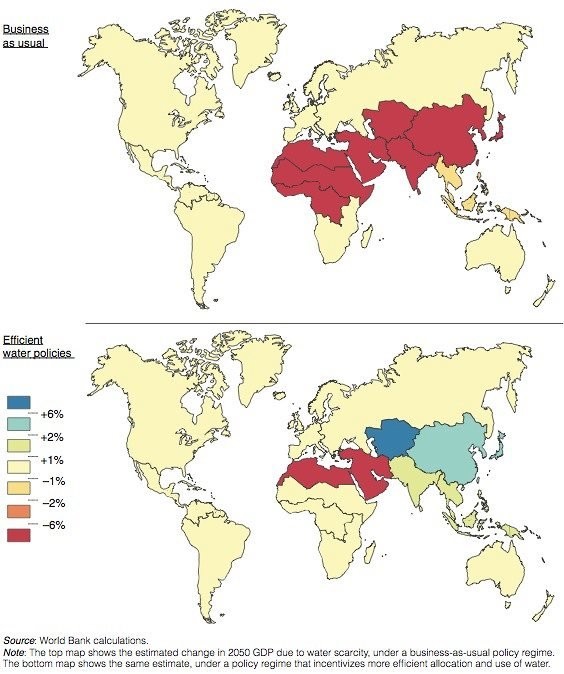Climate change will cost East Asia 6% of its GDP

Image: REUTERS/Amr Abdallah Dalsh
Climate change is set to have a dramatic effect on the availability of water across the world, seriously impacting growth in many places.
A report from the World Bank on climate change, water and the economy predicts that some regions could see growth rates decline by as much as 6% of GDP by 2050.
Unless changes to water policies are introduced, growing demand in cities and use in agriculture could lead to shortages in areas where water is currently plentiful.
In regions already experiencing shortages this is likely to worsen, potentially sparking conflicts and leading to forced migration.
Cities could see water availability cut by as much as two-thirds by 2050, compared to 2015 levels. This is due to less freshwater and increased use in energy and agriculture.
Jim Yong Kim, World Bank President, notes that “water scarcity is a major threat to economic growth and stability around the world, and climate change is making the problem worse”.
He recommends that countries take steps to better manage water resources.
“Our analysis shows that some regions with large populations could be living with long periods of negative economic growth. But countries can enact policies now that will help them manage water sustainably for the years ahead.”
Regions most at risk from water shortages and the subsequent economic declines include Central Asia, East Asia, the Middle East, and the Sahel in Africa.

As the above map shows, North America, Latin America, Europe and Australia are unlikely to see much of a negative impact on GDP due to water scarcity.
In the worst-case scenario, the Middle East could see a 14% decline in GDP, followed by the Sahel and Central Asia, which could see declines of more than 10%.

There is a way to lower the costs from water scarcity, through improved policy decisions and investment in creating water-secure and climate-resilient economies.
The report recommends better planning for water resource allocation, incentives to increase water efficiency, and investments in infrastructure for more secure water supplies.
The author of the study, Richard Damania, notes: “When governments respond to water shortages by boosting efficiency and allocating even 25% of water to more highly-valued uses, losses decline dramatically and for some regions may even vanish.”
These improved policies could lower the GDP loss for many regions, and some regions could see positive growth.
Central Asia could see the biggest growth, with improved policies potentially adding over 11% to GDP for the region.
The report highlights the importance of water management, not only in creating climate-resilient economies, but also for achieving the Sustainable Development Goals.
Have you read?
Don't miss any update on this topic
Create a free account and access your personalized content collection with our latest publications and analyses.
License and Republishing
World Economic Forum articles may be republished in accordance with the Creative Commons Attribution-NonCommercial-NoDerivatives 4.0 International Public License, and in accordance with our Terms of Use.
The views expressed in this article are those of the author alone and not the World Economic Forum.
Stay up to date:
Fresh Water
Related topics:
Forum Stories newsletter
Bringing you weekly curated insights and analysis on the global issues that matter.
More on Climate Action and Waste Reduction See all
Planet in focus: The technologies helping restore balance – and other news to watch in frontier tech
Jeremy Jurgens
November 13, 2025






